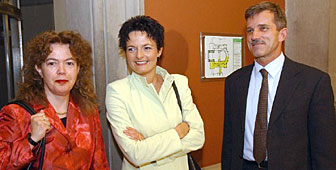Government supports legalised abortion

The Swiss government has presented its position for legalising abortion and urged the Swiss public to vote "yes" in the June 2 referendum.
The justice minister, Ruth Metzler, said on Friday the 1942 abortion law needed to be changed to decriminalise the procedure.
Although abortion is illegal in the country, currently, some 13,000 pregnancies are legally terminated each year, using loopholes in Swiss legislation.
“With our current legal system it’s not the woman herself who can decide whether to have an abortion or not. The Swiss parliament wants women to be able to make their own decision,” Metzler told swissinfo.
Under the current law, the termination of a pregnancy is illegal, unless a woman’s health is in danger. In practice, however, more liberal solutions have been introduced in recent years and getting medical approval from a doctor, which is required before an abortion can be carried out, is relatively easy.
No prosecutions
There have been no abortion-related prosecutions since 1988 in Switzerland and in March last year both houses voted in favour of legalising the procedure if undertaken within the first 12 weeks of pregnancy.
If the Swiss vote in favour of this revised legislation, abortion will technically become legal, but women will still have to seek medical advice before being allowed to have their pregnancy terminated.
“The Swiss government thinks it is important to have a good and comprehensive consultation. Parliament decided [in favour of] obligatory consultation with doctors but we still have family planning centres. We are convinced that they are still needed, even though they are not obligatory,” Metzler said.
Mother and child
The justice minister also emphasised that the government was urging the Swiss to vote against an anti-abortion initiative called “For Mother and Child”, which is also scheduled for June 2.
Metzler thinks the initiative, which calls for a strict ban on abortion except for extreme cases, is even more regressive than the still-valid 1942 law.
“Voting in favour of this initiative would mean going even further back than 1942 and that would be bad,” Metzler told the press conference.
However, Daniel Trethaway of the Mother and Child group, which collected half of the 50,000 signatures required in Switzerland to challenge a new law, believes the country does not need a new law on abortion.
“I don’t know why we should change this law. A child is still a child and I think it would be totally incorrect to adjust the law in such a matter, as reality has to follow the international human rights,” Trethaway told swissinfo.
The group also has condemned abortion after a rape, as they do not believe a child should be blamed for such an act. “A rape is something very bad of course, however, it’s no reason to pass a law that punishes the unborn child for it,” Trethaway said.
But for Metzler it is clear that forcing a woman to bear a child conceived during a rape would present an unacceptable burden for the rape victim.
“To force a woman to have a child after being raped is one of the biggest burdens and is a humiliation for the victims,” she said.
Supporting choice
During the press conference, Metzler emphasised that there was a big difference between saying yes to the legislation, and saying yes to abortion. The legislation gives women the option of abortion — the right to choose whether or not the procedure is appropriate personally.
It removes the illegality, should a woman find it necessary to exercise the option.
“Our aim is to have as few abortions as possible and with this new law we don’t want the abortion rate to increase. We want to decriminalise the procedure and if you vote yes on June 2nd, you don’t necessarily have to accept every decision a woman makes within the new law,” she said.
Most European countries, including all of Switzerland’s neighbours, have already legalised abortions in the early stages of pregnancy. Restrictive legislation is in place in traditionally Catholic countries, notably Spain, Portugal, Poland and the Republic of Ireland.
by Billi Bierling

In compliance with the JTI standards
More: SWI swissinfo.ch certified by the Journalism Trust Initiative
You can find an overview of ongoing debates with our journalists here . Please join us!
If you want to start a conversation about a topic raised in this article or want to report factual errors, email us at english@swissinfo.ch.